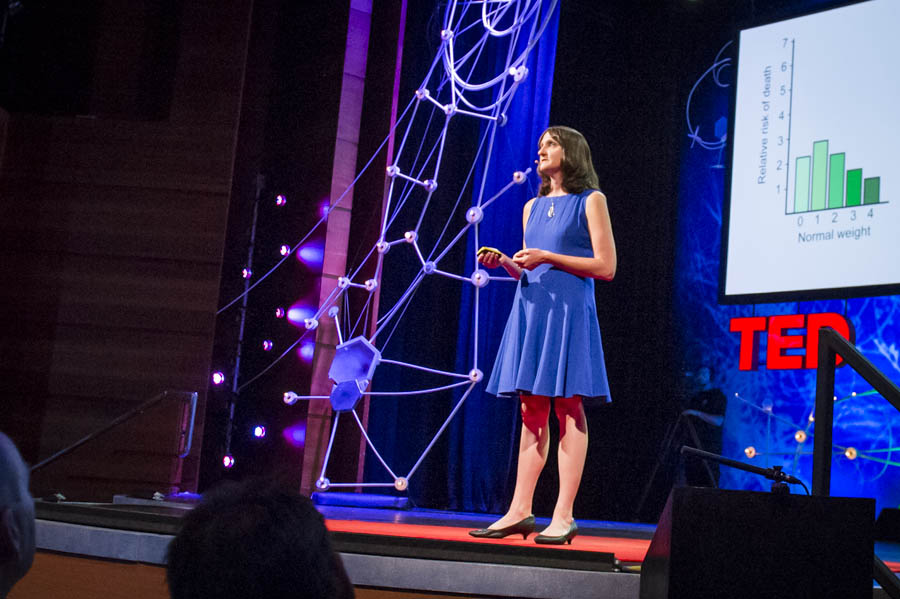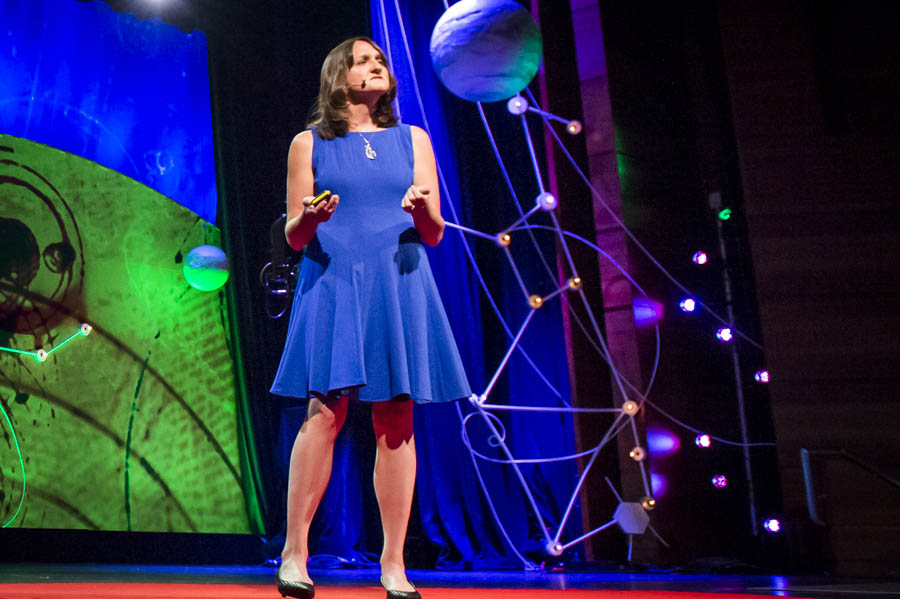Standing on the TED stage looking stunning in a blue dress, neuroscientist and author Sandra Aamodt reveals that three and a half years ago on New Year’s Eve, she made a decision: She gave worrying about her weight. Instead, she learned to eat mindfully — and lost 10 pounds. For Aamodt, who had been dieting unsuccessfully for 30 years, this was a major life change. She started her first diet at age 13, and found that the weight always came back.
As a neuroscientist, she wondered what made losing weight so hard. Turns out the brain is an incredibly efficient regulator of body weight. Isn’t weight loss about how much you eat versus how much energy you burn? Nope, it’s not that simple an equation: it turns out that hunger and energy use are controlled by the brain, mostly behind the scenes, and this unconscious force is stronger than mere willpower. The brain has its own sense of what your body should weigh — no matter what you believe — called the set point, which has a range of about 15 pounds. While lifestyle changes can shift your weight within this range, it’s much harder to move outside of it.
Like a thermostat, Aamodt says, chemical messengers from the hypothalamus gland help regulate hunger, activity and metabolism to keep your weight stable as conditions change. Think of it this way: You can try to change the temperature in your house by opening a window in winter, but your thermostat will kick up the heat to balance the difference in temperature. Our brains work the same way, managing to maintain our weight at what it considers normal. It’s a response to our evolutionary history: For most of human history, food was scarce, and our bodies worked hard to keep us from starvation.
This means that whether you start out fat or thin, when you try to override the system by dieting, the brain thinks you’re starving. You get hungrier, and your muscles burn less energy. Even after keeping weight off for seven years, your brain still wants to make you gain it back. This makes sense in evolutionary terms, increasing our chances of survival in time of famine, but as Aamodt wryly notes, it doesn’t work out so well in our time of drive-through burgers. (Changing the food environment, she suggests, might be the most effective solution to obesity.) Even worse news is that while set points can go up, they rarely go down.
So if we’re outgunned by our hardwiring, what hope is there? Aamodt says psychologists categorize eaters into two sets: intuitive eaters, who eat according to their bodies’ hunger signals, and controlled eaters, who try to control when they eat — like dieters. Intuitive eaters are less likely to be overweight, while the controlled eaters are vulnerable to binging. Children are particularly vulnerable, she says: Girls who diet in their early teens are more likely to gain weight five years later, no matter their starting weight, and the same factors lead to eating disorders. Something else that predictably leads to eating disorders: a family member who makes fun of them for their weight. “So,” Aamodt says, “don’t do that.”
But surely we have to keep weight down for health reasons? That’s another myth. Aamodt says lifestyle choices are far more important to maintaining health than weight. She cites a study that measured the risk of death over a 14-year period based on four healthy habits: eating fruits and vegetables, getting exercise, not smoking, and drinking in moderation. For someone who is overweight and who practices no healthy habits, the risk of death is high, but adopting just one good habit brings that person back within normal range. (Note that this is true for overweight people, not obese people. For obese people, it takes all four habits to bring them back into a normal range.) And regardless of weight, for those who adopted the four healthy habits, weight makes very little difference to health. The message: if it’s really health you’re worried about, you can take control by adjusting your lifestyle.
And if that’s not convincing enough, Aamodt makes the counterintuitive assertion that dieting typically causes gain weight over time. Five years after a diet, most people have regained the weight — and 40% have gained even more than they lost. It would seem that dieting contributes to obesity rather than preventing it.
For her own part, Aamodt solved the conundrum by becoming an intuitive eater, shifting her attitude towards food. “My solution, in a word, is mindfulness,” she says. Not as in yoga or meditation, but giving yourself permission to eat whatever you want, slowly, and without distractions, paying attention to how your body feels when hungry or satisfied, and letting hunger determine when you’re done. “It took about a year to learn,” says Aamodt, “but it was worth it. I’m so much more relaxed about food than I ever have been in life. It’s like aliens have taken over my brain.”
She warns that intuitive eating may not make you lose much weight, but every diet tested has failed in the long run, and as willpower is a limited resource, any weight-loss strategy that relies on it is doomed to fail when it’s necessary to focus on something else. It also does a lot of collateral damage. In the United States, 80% of girls at age 10 have been on diet. Shocking. “Our daughters have learned to measure their worth by a wrong scale,” concludes Aamodt. “If they stopped dieting, most of them would be happier and healthier, and as adults most of them would probably be thinner. I wish someone had told me that when I was 13.”
Sandra Aamodt’s talk is now available for viewing. Watch it on TED.com »



Comments (42)
Pingback: Why Your Brain Doesn’t Want You to Lose Weight | AbFab50
Pingback: When Your Daughter Starts Hating Her Body | Center for Eating Recovery
Pingback: 8 Reasons Dieting Doesn't Work
Pingback: The Futility of Dieting | Rethinking Food
Pingback: TEDGlobal Talk on the futility of dieting | Eating Disorder Therapy | Tabitha Limotte
Pingback: An Invitation To Celebrity Dietitians: Look At The Science | Fat Chat
Pingback: MN Rural Round-Up: July 2013 | Minnesota Rural Partners
Pingback: Early dieting predicts weight gain | Sandra Aamodt
Pingback: Long-term effects of dieting | Sandra Aamodt
Pingback: Weight and health – show me the data! | Sandra Aamodt
Pingback: June 12: A bit of benching and a bunch of feelings | GIRLS CAN LIFT
Pingback: Dieter or writer – We need to outwit our reptilian brains | SOMETIMES WORDS HELP